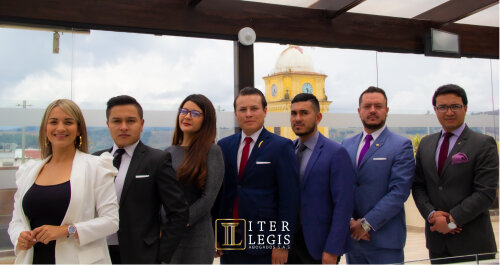Best Civil & Human Rights Lawyers in Tunja
Share your needs with us, get contacted by law firms.
Free. Takes 2 min.
List of the best lawyers in Tunja, Colombia
About Civil & Human Rights Law in Tunja, Colombia
Civil and human rights law in Tunja, Colombia, is grounded in both national legislation and international treaties to which Colombia is a party. These laws seek to safeguard the basic rights, freedoms, and dignities of all people living in the country, regardless of their nationality, gender, race, religion, or socioeconomic status. Human rights are enshrined in Colombia’s Political Constitution, and local governments in Tunja are responsible for ensuring these rights are respected, protected, and fulfilled. Examples of civil and human rights include the right to life, equality before the law, freedom of expression, freedom of religion, protection against discrimination, and the right to a fair trial.
Why You May Need a Lawyer
Many situations can arise where someone in Tunja may require the assistance of a lawyer specializing in civil and human rights. These may include cases where an individual believes their rights have been violated by a public official, law enforcement, or another private party. Examples include unlawful detention, discrimination in employment or public services, lack of access to education or health care, violation of the right to a peaceful protest, or threats to personal safety by authorities. Victims of gender-based violence or discrimination may also need legal help. A lawyer will provide guidance, help gather and present evidence, advise on possible remedies, and represent clients in administrative or judicial proceedings.
Local Laws Overview
In Tunja, as elsewhere in Colombia, civil and human rights are protected by the Constitution of 1991, which outlines fundamental rights for all citizens and residents. Local governments must comply with national standards related to equality, non-discrimination, due process, and access to justice. Key aspects include:
- Mechanisms for protecting rights, such as the tutela process, which allows individuals to seek immediate judicial protection of constitutional rights
- Anti-discrimination laws protecting against unfair treatment based on race, gender, religion, political opinion, or sexual orientation
- Specific laws against domestic violence and gender-based discrimination, with specialized family and criminal courts to address these issues
- Administrative recourse for those who believe their rights have been violated by public officials
- Legal frameworks supporting the rights of indigenous communities, children, and persons with disabilities
Local courts and the Defensoría del Pueblo (Ombudsman’s Office) play an important role in protecting civil and human rights in Tunja.
Frequently Asked Questions
What rights are protected by the Colombian Constitution?
The Constitution protects rights such as life, equality, freedom of expression, religion, education, work, health, privacy, and due process, as well as special protections for vulnerable groups.
What is a acción de tutela?
A acción de tutela is an emergency legal mechanism that allows anyone to seek immediate judicial protection of constitutional rights if they believe these rights are under threat or have been violated.
How can I file a claim if my rights have been violated?
You may present a formal complaint to local authorities, the Defensoría del Pueblo, or the Fiscalía, or file an acción de tutela in a local court. A lawyer can help guide you through these processes.
Who can be held accountable for civil rights violations?
Both public officials and private individuals or entities may be held accountable, depending on the circumstances. In some cases, government bodies may have a duty to compensate victims.
Are there specific protections for women or vulnerable groups?
Yes, there are legal protections to address discrimination, violence against women, support for persons with disabilities, indigenous rights, and protections for children and the elderly.
Can foreigners access civil and human rights protections in Tunja?
Yes, all people within Colombian territory, including foreigners and residents, are entitled to constitutional civil and human rights protections.
What should I do if I am the victim of police abuse?
Document the incident, seek medical help if needed, file a complaint with the Fiscalía, the Defensoría del Pueblo, or the Procuraduría, and consult a lawyer as soon as possible.
Is there free legal assistance for civil and human rights cases?
Yes, governmental organizations such as the Defensoría del Pueblo and some legal aid clinics can provide free legal advice and representation in certain cases.
What are common signs of discrimination?
Discrimination can include unfair treatment in employment, education, health care, housing, public services, or being subject to harassment, segregation, or hate speech based on personal attributes.
How long do civil rights cases typically take in Tunja?
Timelines vary depending on the case type and complexity. Urgent matters filed using the acción de tutela procedure can be resolved within days or weeks, while more complex cases may take several months.
Additional Resources
Several organizations and government entities are available to assist those facing civil and human rights issues in Tunja. These include:
- Defensoría del Pueblo (Ombudsman’s Office) - Provides legal advice, education, and representation for victims of human rights violations.
- Personería Municipal - Local government officials who oversee the protection of citizens’ rights and offer support for complaints.
- Procuraduría General de la Nación - Oversees the behavior of public officials and investigates abuses or misconduct.
- Fiscalía General de la Nación - Investigates and prosecutes criminal violations, including severe human rights abuses.
- Legal Aid Clinics (Consultorios Jurídicos) - Law faculties at local universities often provide free legal support for civil and human rights matters.
- Non-governmental organizations (NGOs) - There are regional and national NGOs that specialize in various areas of human rights and provide important resources and support.
Next Steps
If you believe your civil or human rights have been violated in Tunja, Colombia, it is important to act swiftly. Gather all relevant documents, evidence, and details related to your situation. Reach out to one of the resources listed above or consult with a lawyer who specializes in civil and human rights law. You may start by filing a formal complaint or initiating an acción de tutela, especially if your situation is urgent. Remember that many organizations and legal professionals are available to help guide you through each step of the process, from initial consultation to potential court proceedings. Taking timely action can be crucial to achieving a positive outcome and ensuring your rights are fully protected.
Lawzana helps you find the best lawyers and law firms in Tunja through a curated and pre-screened list of qualified legal professionals. Our platform offers rankings and detailed profiles of attorneys and law firms, allowing you to compare based on practice areas, including Civil & Human Rights, experience, and client feedback.
Each profile includes a description of the firm's areas of practice, client reviews, team members and partners, year of establishment, spoken languages, office locations, contact information, social media presence, and any published articles or resources. Most firms on our platform speak English and are experienced in both local and international legal matters.
Get a quote from top-rated law firms in Tunja, Colombia — quickly, securely, and without unnecessary hassle.
Disclaimer:
The information provided on this page is for general informational purposes only and does not constitute legal advice. While we strive to ensure the accuracy and relevance of the content, legal information may change over time, and interpretations of the law can vary. You should always consult with a qualified legal professional for advice specific to your situation.
We disclaim all liability for actions taken or not taken based on the content of this page. If you believe any information is incorrect or outdated, please contact us, and we will review and update it where appropriate.
Browse civil & human rights law firms by service in Tunja, Colombia
Tunja, Colombia Attorneys in related practice areas.









